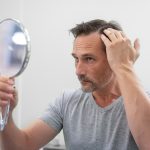How Genetics Plays a Role in Balding
Ever wondered why some people keep a full head of hair their entire life, while others start noticing hair loss or a receding hairline early on? This might have more to do with your genes than you realize. Take a moment to dive into the genes behind hair loss and how our team can help you enjoy a fuller head of hair again. A look at hair genetics Your hair is significantly influenced by the genetic material you inherit from your parents. It’s ot just the color and texture, but also how, when, and sometimes, why you might start losing it. The gene variants associated with hair loss can be passed down from either of your parents. This makes your family history a key indicator of your hair’s fate. If several members of your family experienced hair loss, it’s worth paying attention to your hair’s health and considering early preventive measures. Early intervention can help in managing and sometimes significantly delaying the onset of genetic hair loss. For those curious about their genetic likelihood of experiencing hair loss or balding, talk to your provider about genetic testing. These advanced tests can identify specific genetic markers associated with hair loss. Being aware of your genetic predisposition helps you to make informed decisions regarding your hair’s health. It helps you to be proactive, taking part in preventive care, and thinking about treatment options that address your unique genetic makeup. Understanding androgenetic alopecia Androgenetic alopecia is a common form of hair loss both men and women can experience. Researchers believe it results from a combination of genetics and hormonal changes. In men, this type of hair loss shows up as a receding hairline and hair thinning on the crown. Women, on the other hand, might notice a gradual thinning of hair across the entire scalp. Awareness of your family’s history of androgenetic alopecia can help you prepare for and combat potential hair loss. You can take preventive care or seek professional advice earlier rather than later. The role of hormones Genes alone don’t always explain hair loss. Your hormones also play an important role. Dihydrotestosterone (DHT), a form of testosterone, is often a significant player in hair loss. Elevated levels of DHT can lead to the miniaturization of hair follicles, resulting in thinner, shorter, and more fragile hair. Both men and women produce testosterone, so both can experience the effects of DHT on hair loss. Understanding your hormonal health, alongside your genetic profile, offers a more comprehensive look at the potential for and progression of hair loss. Managing genetic hair loss Once you know your family history and the results of any genetic and hormonal tests, you can take steps and be proactive about managing hair loss. There are some preventive measures you can take, which can help you maintain your hair. For example, adopting a stress-minimizing lifestyle and a hair-healthy diet can help you keep your hair healthy and minimize hair loss. You might also consider using shampoos and other topical therapies designed to slow hair loss. However, if you’re worried about hair loss, consulting with a hair restoration specialist, like Dr. Maag, is the best way to learn the most effective treatment options for you. As a physician, Dr. Maag approaches your hair loss through a medical lens. Taking into account your family history, unique genetics, medical history, and the results of a physical exam, he develops a personalized treatment plan. If you want more information about balding and hair loss and the ways you can hold on to your hair, don’t wait to schedule a consultation online or over the phone.








